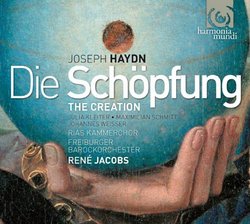Gutsy, Vivid Performance
R. Gerard | Pennsylvania USA | 10/12/2009
(5 out of 5 stars)
"On its own, I must admit that Haydn's Die Schoepfung has never been one of my all-time favorites of classical western music. Part of the reason is the lack of recordings of Die Schoepfung that have that "X-factor." The closest candidate was recording by Christoph Spering for the Naxos label with Hanno Mueller-Brachman and Sunhae Im (a favorite of mine who often performs under Rene Jacobs' baton).
Die Schoepfung is one of the best examples of tone-painting. Papa Haydn wrote out musical representations of nature: rolling waves, chirping birds, gliding whales, the rays of the sun, etc. I suppose the X-factor that has been been missing from past recordings was the ability to portray such things convincingly.
As a conductor, Rene Jacobs has rarely failed to impress me. In his operatic recordings he has been successful at bringing out such varied emotional extremes, such that in an immensely "illustrative" work as Die Schoepfung, I had high expectations. I'm happy to say that he has met those expectations. Jacobs really brings out the winds during representation of the first beams of light, represented by Haydn in a simple yet stunning wide chord in triple forte. The first baritone aria where Johannes Weisser describes the rolling, foaming billows of water as God creates the sky is at once unrelenting and violent, then tranquil as Jacobs takes control of Haydn's representation of a calming sea storm.
For me, the standout singer is Johannes Weisser who has already impressively sung the title role in Jacobs's Don Giovanni. We have him here doubling as the angel Raphael and as Adam. Many listeners were taken off-guard (pleasantly or unpleasantly) but his young sounding voice - he was in his mid-twenties when he sang the Don (a casting choice which I personally thought made perfect sense.) In Die Schoepfung we find Weisser's voice much matured with a smooth and full-lower register which is so necessary in his role of the angel Raphael.
This is also the first time I've ever heard of Julia Kleiter, singing the roles of Gabriel and Eve. It is a gorgeous, strong voice that I hope Jacobs will employ in upcoming recordings.
Ever since Jacobs' Cosi Fan Tutte his signature has been his employment of a heavily improvising continuo section, and ever since his La Clemenza di Tito, there have been sections during which the fortepiano adds some lengthy improvisations to introduce recitatives. True, many may find this practice distracting, even a hindrance to the drama. Perhaps it takes a few listenings to understand it, although evidence for such a practice extending from the Baroque to late Classical is strong, especially in the music of Haendel and Mozart. It begins to sound so natural, it becomes difficult to imagine Baroque and Classical performance of recitative without such improv.
The widely varied dynamics in the orchestra and choir are ever present as always for a Rene Jacobs recording, and so much the better. Perhaps part of that "X-Factor" is that in an oratorio such as this, the orchestra and chorus must present their music in such a way as a narrator or actor delivers his/her lines. Drama is paramaount here.
This is a Die Schoepfung I will be returning to often, while Spering's Die Schoepfung is a close second."
An easy first choice for a period 'Creation,' and a great re
Santa Fe Listener | Santa Fe, NM USA | 01/06/2010
(5 out of 5 stars)
"Unlike the lead reviewer, I can think of many recordings of The Creation that had a special X-factor, beginning with my favorite, Leonard Bernstein from New York on Sony, extending through the second Bernstein recording, two from Karajan, and the period production under Spering on Naxos, which he mentions. This work, generally recognized as Haydn's masterpiece, has enjoyed a number of HIP recordings, but I think that Rene Jacobs easily sweeps the competition. He is an imaginative musician, which the average HIP conductor isn't, and he's not hindered by the usual wheezy, creaky timbre of antique instruments -- one gets the feeling of full emotional expression. Even the strings playing without vibrato sound sweet and confident. Of course we get the usual contradiction between singers using full vibrato while the instrumentalists are studiously avoiding it. The small, precise professional chorus uses women in place of boys and also employ full vibrato, to lovely effect.
What this says is that Jacobs knows how to make intelligent choices when it comes to period style. We don't hear a harpsichord clacking along during big choruses, an artificial effect created solely by the microphone. Jacobs uses the more suitable fortepiano, and although there is some florid ornamentation, he allows many vocal lines to unfold as written (in part this may be because The Creation is more a religious work than an opera, calling for a more chaste style). Like the lead reviewer, I love baritone Johannes Weisser, who is jsut as charismatic as he was playing Don Giovanni for Jacobs -- who says that a religious theme must be boring? Almost as good is tenor Maximilian Schmitt, with the kind of light, flexible lyric tenor that serves Baroque and early Classical music so well. My only disappointment came with soprano Julia Kleiter, who tiptoes through her ddifficult arias (generally at a cautious tempo), in marked contrast to Weisser's daring. Her sweet, modest voice is better suited to the simpler lines of Even's music in Part II.
As for Jacobs himself, no praise would be too excessive. He has a marvelous touch in this score, choosing totally convincing tempos and balances, but more importantly always making sure of the human touch. Haydn gave the world a tender, touching account of our mythic beginnings, and for once every note sounds as touching as Haydn intended.
P.S. - I should mention that the deluxe packaging include a bonus DVD on the making of the recording."

